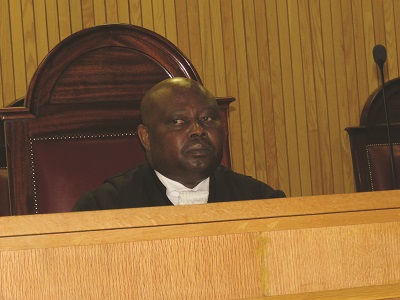By Thoboloko Ntšonyane
MASERU – The Chief Justice Sakoane Sakoane has raised concerns over the overwhelming burden of cases that the courts are handling.
This significant pressure he pointed to inefficiencies of the government and parliament.
CJ expressed these sentiments during the recent judicial symposium on Latimer House Principles held in Maseru.
The Latimer House Principles strive for promotion of good governance, rule of law and democracy within Commonwealth States. These sets of guidelines address the relationship between the three arms of government being the Executive, Judiciary and Legislature by emphasizing on the importance of separation of powers.
According to the Commonwealth Secretariat’s Head of Rule of Law, Dr Tawanda Hondora, the Latimer House Principles are about checks and balances between the three arms of State. These principles he said are at the heart of democracy adding that dialogue is critically important between the arms of State.
He said there is a “constant struggle” of power between the Judiciary and the other two arms of State, especially the Executive when it comes to the administration of justice.
The head of the Judiciary further pointed out that the Constitution provides for the separation of powers, yet the Judiciary is inundated with the cases and matters which the Legislature and the Executive should have long settled.
“We at the Judiciary are always adjudicating over cases and matters that we thought in the 21 Century should be settled long ago, but what we see is that they keep on coming,” he stressed.
Sakoane who also doubles as the Chairman of the Judicial Service Commission (JSC) could not expound what these matters are, but said “if we had angels on earth, there would be no need for the law, we only have laws because we don’t have angels”.
Drawing comparisons to Botswana and Eswatini, he said if “We were to benchmark against Swaziland [now Eswatini] and Botswana, Lesotho has not progressed a lot”.
The head of judiciary’s remarks raises concern and urgent need to reform this arm of State. The Judiciary is one of the sectors that are undergoing the reforms process.
The work of reforms is to among others reform institutions and laws. When complete, the Judiciary is set to take a different form from what it is with the changes that will come to the fore.
The Appeal Court which is the highest court in the land will also be phased out, making a way for the Supreme Court once the reforms are complete. At the moment, this court holds two sessions annually in April and October, save for its President, Prof Kananelo Mosito, it is manned by judges from the Southern African Development Community (SADC).
They are: Justice Petrus Damaseb from Namibia, Justice Philip Musonda both from Zambia, Justice November Tafima Mtshiya and Justice Moses Hungwe Chinhengo both from Zimbabwe, and Justice Johann Van der Westhuizen from South Africa.
When Sakoane assumed the office of the CJ, he introduced open interviews for judges. Unlike in the past, where the Judicial Service Commission (JSC) recommended names of judges to His Majesty for consideration, now the JSC issues a call for interested and competent candidates to apply for the bench.
In the efforts to decentralize the High Court, the Judiciary welcomed another High Court in Ts’ifalimali, Leribe on May 16 last year. This court serves the north region, covering districts of Leribe, Mokhotlong, and Butha-Buthe.
Although progress is slow, there are plans to establish another High Court in Mohale’s Hoek, which will serve the south region and cover districts such as Mafeteng, Mohale’s Hoek, Quthing and Qacha’s Nek.
After shortlisting, the candidates are interviewed publicly, a move that has earned an appraisal of the members of the public and the civil society as it endeavors for transparency and meritocracy in the appointment of the judges.
The courts usually come under fire for their delay in dispensing the cases. Previously, while addressing this issue, CJ highlighted that the delays in administration of justice occur because the cases pass through the police then they are taken to the prosecution before they reach judicial officers.
He has also introduced the 90 day policy, which requires that once the case has been completed, the judges should issue the ruling within a period of 90 days.
The symposium had attracted participation of local High Court judges, judges from the region and Magistrates.
National University of Lesotho (NUL)’s Dean of Faculty of Law, Dr Letzadzo Kometsi believes that there is a “constant struggle” between the Judiciary and Parliament.
He shared a story about Israel, mentioning how parliamentarians attempted to curtail powers of the Supreme Court to render Executive decisions void, adding that the whole struggle is on account of parliament attempting to usurp powers of the Judiciary to keep it in check.
“This struggle is constant and it continues and it happens not only in our developing countries but also in developed countries,” he said.
Dr Kometsi emphasized that the decisions made by the courts should be implemented even if they are against the government. The Dean said when the government makes decisions contrary to democracy and infringe upon the people’s rights, the Judiciary should discharge its mandate in keeping the former in check.
He stressed that the Judiciary should not only denounce unlawful acts, but also need “brevity” arguing that “Judicial activism” is necessary to move beyond the confines of human rights protection, allowing for judgment even in the absence of supporting laws.


